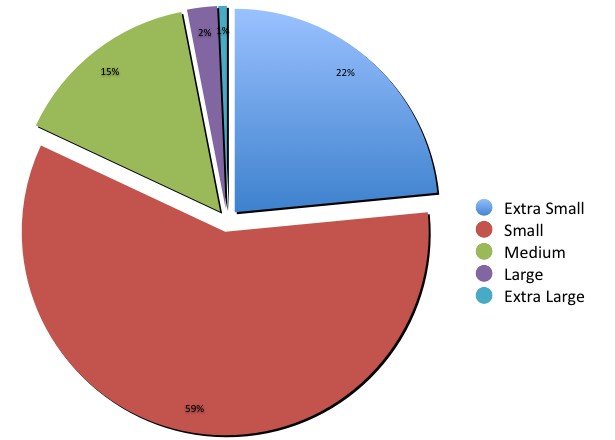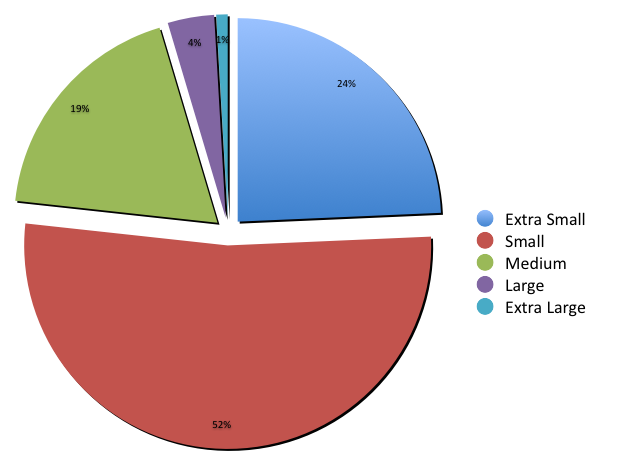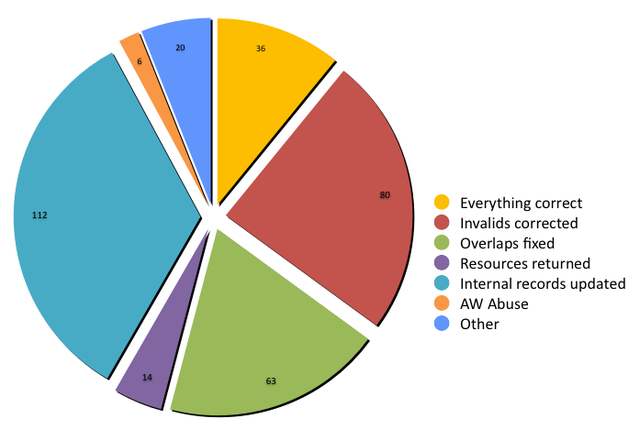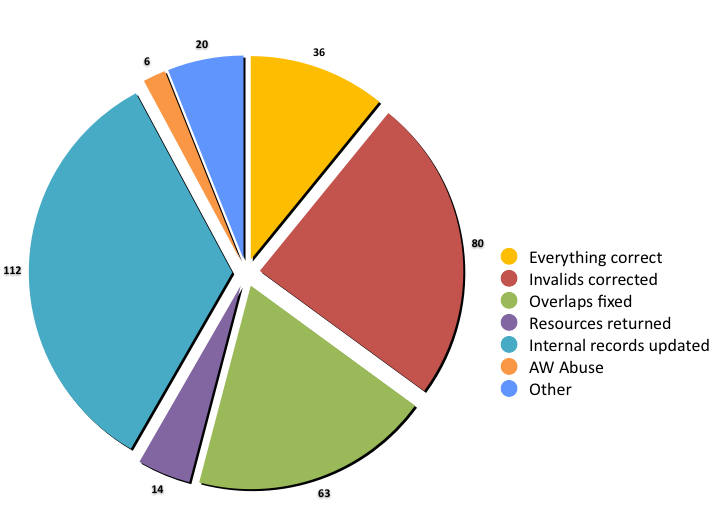The RIPE NCC preforms audits of the Local Internet Registries contact data and resource registration data maintained by the LIR. In 2011 around 400 audits were opened and as of 17 January 2012 270 have been completed. In this article you can find some statistics and results of these audits.
Introduction
The RIPE NCC audit activity pro-actively checks the quality and validity of registry data. At the 1996 Contributors Committee Meeting (which later became the RIPE NCC General Meeting), the RIPE NCC was asked to check the validity of registry data. 'Audit' has been a specific activity of the RIPE NCC since that time. The RIPE NCC plans to increase the total number of audits performed as the concern in the RIPE community for data quality increases.
In Figure 1, you can see that most LIRs audited were in the 'small' billing category.

Figure 1: Audited LIRs by billing category
This distribution is possibly caused by the fact the most LIRs are in this category. In the image below you can see the percentage of LIRs in each billing category in 2011.

Auditing Details
The purpose of an audit is to ensure that the information an LIR has registered is accurate, consistent and in compliance with the RIPE community policies and the terms and conditions of the RIPE NCC service agreement. This information includes the contact information registered with the RIPE NCC and the resources information registered in the RIPE database, collectively referred to as the RIPE Registry . Note that this only concerns address space that the RIPE NCC is responsible for, that means legacy address space is not included in this activity. Data quality checks we did for legacy address space are described in Ensuring Registry Data Quality and in Registry Data Quality Assessment - Phase 2 .
As part of an audit, the RIPE NCC reviews three sets of data:
- Contact records
- The organisations's contact information (an LIR can maintain this information via the LIR Portal)
- Resource records
- List of approved assignments is current
- Are public resources publicly announced on the Internet
- Confirm the LIR has archived appropriate information for assignment window assignments
- RIPE database
- Overlapping assignment registrations
- Invalid database registrations
- Assignment window abuse
- Approved assignments are completely or partially un-registered
The RIPE NCC will also verify general policy and terms and conditions, compliance.
A major part of the audit is helping educate LIRs to understand and follow policies and procedures. The RIPE NCC discusses each issue with the LIR under audit and helps to resolve any inconsistencies. The cooperation and support of the LIR is critical.
Results
During an audit, the following issues are typically found:
- Invalid records, such as
- more IP addresses registered than were approved
- unapproved netnames
- missing intenum objects
- Overlapping assignments registered in the RIPE Database
- Resources returned
- assigned PI or AS number resources are no longer valid or in use and are returned to the unused pool
- Internal records updated
- for instance out of date information such as contact, billing and other records
- Assignment window (AW) abuse
- if assignments are made that exceed the LIR's AW or are otherwise not compliant with the AW policy
In the image below, you can see how often each of these issues occurred:

Figure 3: Issues found during completed audits in 2011 (total number of 270 audits)
Out of those 270 completed audits, 36 showed no issues. As seen in the graph above, invalid resource records registered in the RIPE Database and outdated LIR contact information occurred most often.
An audit takes roughly one month from start to finish. Most LIRs are very cooperative and understand that this is an important part of their responsibility as an LIR. The RIPE NCC works with the LIRs during an audit to assist in the resolution of any issues. An audit is closed only when all issues have been resolved or the audit is no longer relevant for other reasons, such as LIR closure, acquisition and so on.
Conclusion and Future Work
The purpose of this article is to give insight into the general picture of the audit activity and hopefully to initiate RIPE community discussion around data quality in general and LIR data quality specifically. Please give us any feedback you might have. We are particularly interested to hear how the audits help an LIR's operations and how else it can help to ensure the accuracy of the RIPE Registry.
Acknowledgments
This article is based on work done by Timothy Lowe, IP Resource Analyst at the RIPE NCC.
Related Links





Comments 2
The comments section is closed for articles published more than a year ago. If you'd like to inform us of any issues, please contact us.
Shane Kerr •
If only 36 of 270 audits were trouble-free, then it seems to indicate something is wrong with the system. It looks like the invalids and overlaps combined are over 1/3 of audits, which seems like something that should be automated and applied to all members, not just in the context of an audit. Likewise, more active methods to keep internal records updated seems like a good idea. I'm not saying that these ideas in particular need to be implemented, but if we assume that these numbers apply to the remaining 7000+ members, that is a lot of bogus registry information. :(
Timothy •
Thank you for that feedback Shane, the RIPE NCC is constantly looking at ways to improve service provision to the LIRs. This is indeed an area where automation and giving LIRs appropriate tools can play a role. Presently LIRs can see and update all relevant contact information in their own lirportal accounts it is simply a case of LIRs actually maintaining that data. Though we try to avoid spamming our members perhaps the NCC could send regular reminders to LIRs with copies of their current registry information. What do you think? Of even more interest what do the LIRs think? It would be most helpful if this topic could be brought up on the NCC services WG list could you do that please Shane? In the case of RIPE database invalids currently the RIPE NCC is working on providing a comprehensive view of the usage of address space, the invalids, overlaps and all other related information. For quick and easy access, this information will be made available in the LIR Portal. We will also provide the possibility of accessing this information locally, much like members are used to with asused, so you are not solely dependent on a Web UI. Thanks very much again for the feedback and do please keep it coming. Cheers, Timothy RIPE NCC